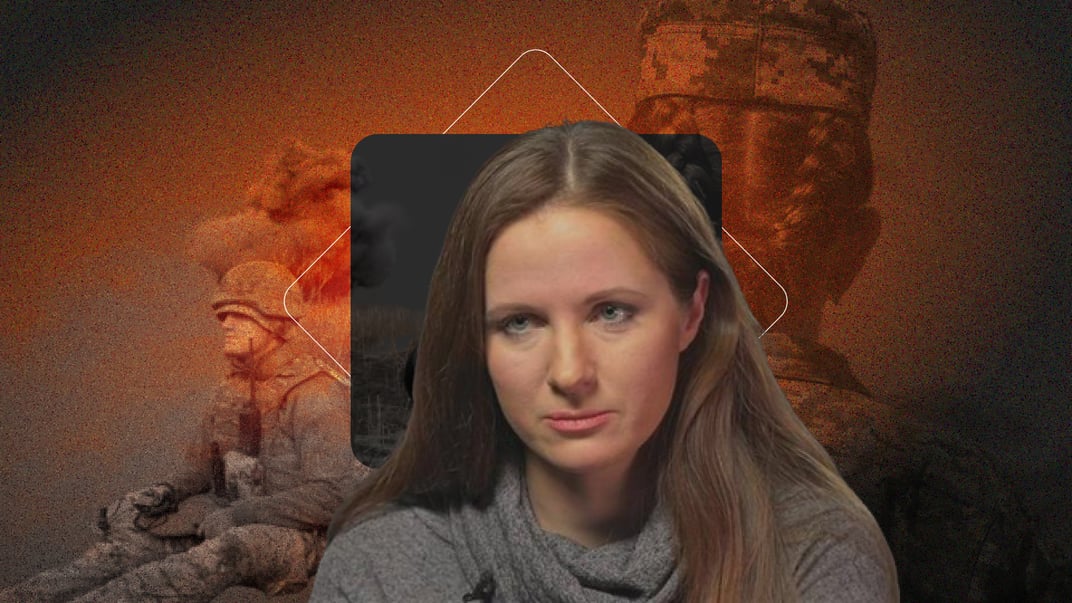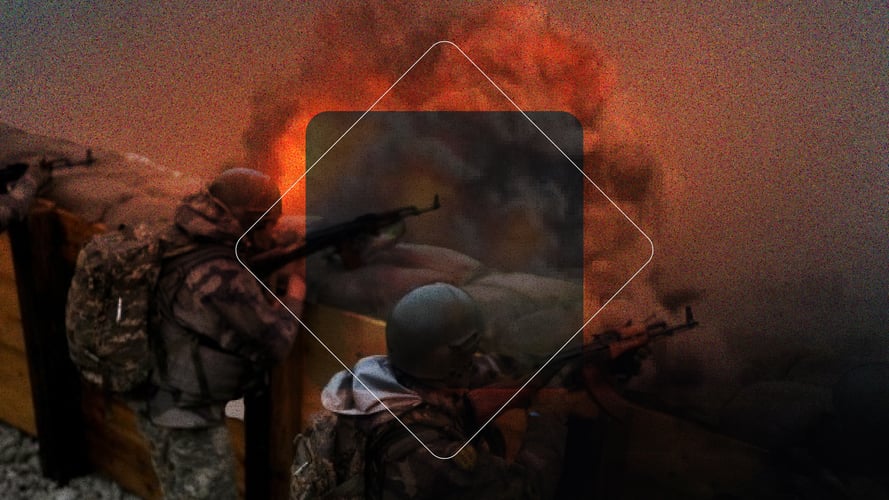"Does the enemy's capture of 500 km² not raise any concerns?" An interview with Evgenia Zakrevskaya.

We are currently witnessing significant changes in the front line that are not in our favor. Do you agree with the assessments that our front has essentially collapsed? What do you see as the key issue: management systems, resources, or a shortage of personnel?
Our main problem is that we still have not gained any technological or organizational advantage over the enemy—neither in the air nor on the ground. At sea, to some extent, yes. But that is insufficient. We cannot have numerical superiority—neither in personnel, nor in equipment, nor in ammunition (for now). Therefore, it is crucial to achieve a technological advantage and be able to use it for victory.
Meanwhile, we still need to hold back the enemy along the entire front line. The longer we lack an advantage, the more costly this holding action becomes in terms of personnel.
Assistance from partners does not automatically translate into an advantage. Although it can help to some extent in establishing parity. Creating technological and organizational advantages is a priority task for the command. It’s not just about a high-tech solution or product—a "super drone" or a "magical ammunition". It is a solution and technology that are implemented on the battlefield and allow for safer approaches / longer strikes / more accurate hits / greater impact.
Such solutions exist, but often they are disconnected from the realities of war, and some brilliant idea lacks quality engineering or spatial implementation. Conversely, it’s often necessary to overcome the habits / laziness / prejudices of the military for a truly valuable solution to work and spread.
It is essential to bring teams of inventors, engineers, and IT specialists as close to the realities of war as possible. To the military, to specific units that utilize their inventions. And to give the military access to inventions even at the stage of their creation. At the stage of setting technical tasks. To reduce the R&D chain by half or even more.
I believe that idea incubators and startups for their implementation should be organized directly within combat units. These units, in symbiosis with engineer-inventors, should serve as incubators/startups. They should receive funding for development, testing, production, and deliver ready-tested products/solutions/evacuation means or a mining system implemented on the battlefield. The best among them should be scaled to the entire army.
Something similar is already happening in a very limited form—where advanced commanders have connections with manufacturers, access to volunteer funds, competencies, and resources for testing and implementing new solutions. But this needs to be systemic and funded by the budget.
Next, I want to touch on a painful personnel issue in the army—the large number of servicemen leaving units voluntarily (figures of about 100,000 military personnel are being mentioned). This has even led to public manifestations—I’m referring to the case of Sergey Gnezdilov, who is drawing attention to the establishment of clear service terms or the right to demobilization. The root cause is evidently critical fatigue. You too have been at war for three years. Do you think the question “Listen, when will I get a replacement?” has reached a critical demand for justice?
I have been in the army for two and a half years. Some have been fighting for 5, 6, or even 10 years. I have been here since February 24, 2022, while others have been here since 2014, 2016. Some came as volunteers, others stayed after their conscription. Our forces, which took the brunt in the early days of the full-scale invasion, are made up of volunteers from 2014, 2015, and 2016...
I am not a judge or a prosecutor for the weary, nor do I determine who has a tougher situation, who has been fighting longer than I have, or who is in the infantry.
I can only speak for myself—and I will not go to the SOCH. I cannot imagine how tired one must be to move away from the principle that “you cannot abandon your own who are caught in battle, and you cannot forgive the enemy who is attacking you”.
The demand for justice is a good thing. But by demanding such justice for oneself, you simultaneously deny justice to your comrades who remain in the ranks, and to those who are forever in the ranks. I do not believe that justice for me is more important than for them.
Do you think the idea of clear service terms is realistic under the current conditions? Should the Ministry of Defense, which once promised to legislatively regulate this issue, now communicate this matter honestly?
Simple mathematical calculations, comparing the speed of losses, mobilization of reinforcements (which still need to be trained), and daily observation of the advancing red color on DeepState do not allow me to believe in the possibility of “clear service terms”.
It is somewhat pointless to talk about replacements when there are not even enough new arrivals to replace losses.
What should the Ministry of Defense do about this? At the very least, ensure timely rotations and the actual restoration of units that have sustained losses—before they “run out of infantry”. Ensure the coordination of units after restoration, reinforcement, and training. Allow these servicemen to take all the leave they have not taken since the beginning of the full-scale war.
And I am convinced that during rotations, whenever servicemen are not on the training ground, they should be home with their families, on leave, abroad, in the mountains, by the sea, or in rehabilitation. That is, they should be able to truly rest, recover, communicate with loved ones, live life, drink lavender lattes if they need to, and visit gyms or theaters. Not sweeping the parade ground, “standing at the gate”, or aimlessly hanging around at the PPD.
How can all this be made possible? By activating mobilization. Obviously, it is long overdue to announce mandatory mobilization for women. Control the reality of providing leaves and change the approach to rotations. But, moreover, there must be a humane attitude toward the military from commanders at all levels.
Is open communication with society necessary? Frankly, I don’t know what could be more open than DeepState.
Is the DeepState map closed to public use? And does the enemy’s capture of 400-500 square kilometers a month not raise any thoughts?

What do you think could be a solution to the problem of unlimited service terms for those currently in the army?
First. To calculate not only the terms of service but, first and foremost, the time spent on the “zero line”. And give priority to those fighters who have been on the front line for years to resign. Unfortunately, there are few left, and believe me—not all of them will resign. Or they may use such resignation to transfer to a more effective unit.
Second. Long leaves that the military can actually take.
Third. Timely rotations: to withdraw a unit when infantry losses reach 25%, not when “the infantry has run out” and only aerial reconnaissance and “mortar” are operational.
Fourth. To stop the practice of breaking up units and detaching their parts to different fronts. In such a scheme, losses are greatest, while coordination, interaction, and efficiency are at their lowest.
Fifth. To unblock transfers between units. After all, there are already frequent cases of SOCH specifically for the purpose of transferring to another unit. And this is sometimes almost the “easiest” way to achieve this. There seems to be progress here, and there are certain grounds for hope.
Sixth. A normal humane attitude toward the fighters. To provide maximum opportunities to be at home with family.
You mentioned that our entire generation was born for war. But do you believe we can mobilize enough warriors?
I believe that the general mobilization of women has long been relevant. Of course, this will not completely solve the replenishment issue, but it is also necessary.
Plus, we need to restore order with enlistment exemptions. It should not be the case that, for example, “Ballistics”—a manufacturer of military equipment that provides protection for more than one unit, whose owner and half of the management have been fighting since the first days of the full-scale invasion—cannot reserve its employees, while delivery services, gyms, and hotels do so without problems.
And these are not rare cases—this is a systemic problem. It is clear that something is wrong with the criteria for “critically necessary” and how these criteria are applied.
My statement that we are all born for war is simply a statement of fact. We are born and live here, in Ukraine, at a time when this war with russia began and continues.
Whether we want it or not—we are born for war. And it is up to us whether our children are born for war as well. This choice is very simple: occupation, emigration, or resistance. I choose resistance. And indeed, the only honest choice of a citizen of the state is resistance.</